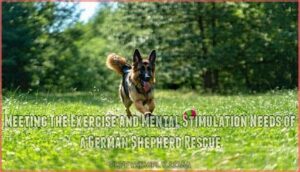This site is supported by our readers. We may earn a commission, at no cost to you, if you purchase through links.
 Finding a German Shepherd rescue isn’t like searching for a needle in a haystack—there are over 350 rescue organizations across the U.S. and Canada.
Finding a German Shepherd rescue isn’t like searching for a needle in a haystack—there are over 350 rescue organizations across the U.S. and Canada.
You’ll want to start with online platforms like Petfinder and Adopt a Pet, or connect with the American German Shepherd Rescue Association.
Don’t overlook local shelters and adoption events where you can meet dogs face-to-face and chat with volunteers who know each pup’s story.
The adoption process involves detailed applications, home visits, and reference checks, but it’s worth it.
Expect adoption fees between $200-$500, covering medical care and spaying.
Your new companion will need patience, consistent routines, and proper training to truly thrive in their forever home.
Table Of Contents
- Key Takeaways
- How to Find a German Shepherd Rescue
- What to Expect When Adopting a German Shepherd Rescue
- What to Consider Before Adopting a German Shepherd Rescue
- How to Prepare Your Home for a German Shepherd Rescue
- Building Trust and Bonding With Your German Shepherd Rescue
- Addressing Behavioral Issues in a German Shepherd Rescue
- Meeting The Exercise and Mental Stimulation Needs of a German Shepherd Rescue
- Providing Proper Nutrition and Healthcare for Your German Shepherd Rescue
- Socializing Your German Shepherd Rescue With People and Other Animals
- Frequently Asked Questions (FAQs)
- What is the hardest age with a German Shepherd?
- What is the most common problem in German shepherds?
- What age is too late to train a German Shepherd?
- What not to do with a German Shepherd?
- What should I do if my German Shepherd rescue exhibits aggressive behavior?
- Are there any specific dietary requirements for a German Shepherd rescue?
- How long do German Shepherds typically live?
- Can German Shepherds live in apartments successfully?
- Do rescued German Shepherds get along with cats?
- What age German Shepherds are best for rescue?
- Conclusion
Key Takeaways
- You’ll find German Shepherd rescues through online platforms like Petfinder, breed-specific organizations, and local shelters—with over 350 rescue groups across the U.S. and Canada, you’ve got plenty of options to explore.
- Expect a thorough adoption process including detailed applications, home visits, and reference checks, with adoption fees ranging from $200-$500 covering medical care and spaying/neutering.
- You’ll need significant time and space, and financial commitment—German Shepherds require 60-90 minutes of daily exercise and training, and can live 10-14 years with ongoing veterinary costs.
- Your rescue dog will need patience during the adjustment period, which can take weeks to months, as they may arrive with behavioral challenges like anxiety, fear-based reactions, or resource guarding that require consistent positive reinforcement training.
How to Find a German Shepherd Rescue
Finding a german shepherd rescue starts with exploring multiple shelter options in your area. Animal shelters serve as excellent starting points, while breed-specific rescues offer specialized knowledge about German Shepherds’ unique needs and temperaments.
Over 350 German Shepherd rescue organizations operate across the U.S. and Canada, making your search easier than finding a needle in a haystack.
Online platforms like Petfinder, Adopt a Pet, and the American German Shepherd Rescue Association provide extensive databases of adoptable dogs. These websites let you filter searches by location, age, and specific traits.
Don’t overlook adoption events hosted by shepherd rescue organizations – they’re perfect opportunities to meet multiple dogs and connect with volunteers who know each dog’s personality.
Find your perfect German Shepherd match at rescue events where volunteers know each dog’s unique story
Consider checking social media and private rehoming situations, but prioritize established rescue dog adoption centers for safety and support. County shelters also house German Shepherds weekly, often with shorter wait times than specialized rescues.
Remember, they’re known for protective instincts, making proper socialization essential.
Legitimate organizations will have references, conduct home visits, and provide ongoing support throughout your adoption journey.
What to Expect When Adopting a German Shepherd Rescue
Adopting a rescued German Shepherd involves several key steps that’ll help facilitate a successful match between you and your new companion.
You’ll navigate an initial evaluation process, complete adoption requirements, and then focus on helping your dog adapt smoothly into their new home while establishing proper training routines.
Building a lifelong bond with your rescue starts with patience, consistency, and plenty of love
Initial Meeting and Evaluation
Once you’ve found your German shepherd rescue, the real work begins with the initial meeting. Most rescues conduct a temperament assessment to evaluate dog compatibility with your family.
You’ll observe the dog’s energy levels, body language, and reactions to new people. This health screening process helps determine home suitability.
Watch how they interact with strangers and respond to basic commands. The rescue staff will share behavioral notes from foster homes, giving you insight into the rescue dog behavior patterns.
This german shepherd temperament evaluation makes certain you’re making an informed decision about whether to adopt german shepherd from that particular rescue dog adoption program. Many rescues require that the entire family, including existing dogs, attend, as seen in the adoption application process.
Adoption Process and Requirements
After your initial meeting goes well, you’ll navigate the german shepherd adoption process through several key steps. Rescue organizations policies typically require thorough screening to guarantee their dogs find lasting homes.
The dog adoption process involves these essential components:
- Application Details – You’ll complete detailed forms covering your living situation, work schedule, pet experience, and long-term care plans
- Home Visit – Most rescues conduct on-site evaluations to verify your yard security, living conditions, and household dynamics
- Reference Checks – Organizations contact your veterinarian, landlord, and personal references to confirm you’re prepared for this commitment
- Post-Adoption Support – Quality rescues provide ongoing guidance, training resources, and check-ins during your dog’s adjustment period
The adoption application process can take days to months, depending on demand. Adoption fees typically range from $200-$500, covering medical care, vaccinations, and spaying/neutering. Think of it as an investment in your dog’s health history rather than a purchase price.
Transitioning to a New Home
Once you complete the adoption paperwork, your German Shepherd rescue needs time to decompress from their journey. The initial days can feel overwhelming for both of you—imagine moving to a foreign country where you don’t speak the language. Your new companion might hide, pace, or refuse food while they figure out this strange new world.
Creating a safe space becomes your first priority. Set up a quiet corner with their bed or crate where they can retreat without interruption. This sanctuary helps reduce anxiety during those vital first weeks.
Here’s what to focus on during this adjustment period:
- Establish housetraining start immediately with frequent potty breaks and consistent praise
- Create a consistent routine for meals, walks, and bedtime to build security
- Watch for positive adjustment signs like tail wagging, playful behavior, and relaxed sleeping
- Stay patient as some rescue dogs need months to fully settle in
Remember, you’re not just adopting a pet—you’re becoming their safe harbor after whatever storm brought them to rescue.
Training and Socialization
Training and socialization form the backbone of your German Shepherd rescue’s successful integration.
Basic obedience commands like "sit," "stay," and "come" establish communication while leash manners prevent pulling during walks.
Positive reinforcement works wonders—reward good behavior with treats and praise rather than punishment.
Socialization skills develop through controlled exposure to new people, animals, and environments.
Your rescued German Shepherd may need behavioral modification to overcome past trauma.
Consistent german shepherd training builds confidence and trust.
Remember, rescue dog tips emphasize patience—some dogs need weeks to show their true personality while adapting to your rescue dog checklist expectations throughout the rescue process.
What to Consider Before Adopting a German Shepherd Rescue
Before welcoming a German Shepherd rescue into your life, you’ll need to honestly assess whether you can meet this breed’s demanding physical and emotional needs.
These intelligent, high-energy dogs require significant time, space, and financial resources, plus they may come with behavioral challenges that need patient, consistent training.
Time and Commitment
Owning a german shepherd rescue isn’t like adopting a goldfish—it’s a marathon, not a sprint. These intelligent dogs demand significant time investment throughout their lifetime care journey.
Your dog ownership readiness will be tested as you navigate the adjustment period, which can stretch from weeks to months depending on your rescue’s background. The adoption commitment extends far beyond the initial rescue process.
You’ll need unwavering dedication to establish a consistent daily routine that includes training sessions, exercise, and bonding time. Think of it as signing up for a part-time job that pays in tail wags and unconditional love.
- Training needs: Expect 30-60 minutes daily for obedience, socialization, and mental exercises throughout your dog’s life
- Exercise commitment: Plan for 2+ hours of physical activity, including walks, runs, and active play sessions
- Routine consistency: Maintain regular feeding, potty breaks, and sleep schedules to help your rescue feel secure
- Long-term companionship: Prepare for 10-14 years of veterinary care, behavioral support, and emotional investment in your furry family member
Space and Exercise Needs
German shepherds need plenty of room to stretch their legs and burn energy.
Your dog living situation should include a fenced yard where they can safely explore and play.
Without adequate yard size, you’ll need creative solutions for exercise routines.
These athletic dogs require daily walks plus additional activities like daily runs or hiking.
A cramped apartment won’t cut it unless you’re committed to extensive outdoor time.
Mental stimulation through puzzle toys and training games prevents destructive behavior.
Consider your play areas carefully—german shepherd exercise needs are substantial, demanding both physical activity and brain challenges.
They also require daily walks to stay happy and healthy.
Behavioral and Health Concerns
Before diving into adoption, you’ll need to understand the behavioral and health hurdles that come with rescue German Shepherds.
Up to 40% show anxiety issues in their first two months, while nearly 30% display fear-based aggression from past trauma.
Hip dysplasia affects 19-25% of rescues, and degenerative myelopathy appears in 3.2%.
These german shepherd health and german shepherd behavior challenges mean higher medical costs and possible work with a dog behaviorist.
Dog anxiety and dog trust issues are common, requiring patience and proper nutrition needs to support recovery.
Financial Responsibilities
Beyond health and behavioral challenges, you’ll need to budget carefully for your German Shepherd rescue.
Adoption fees typically range from $200-500, covering initial veterinary costs like spaying and vaccinations. Monthly food expenses run $50-80 for quality nutrition.
Don’t forget supply budget items like beds, toys, and grooming tools. Dog medical expenses can surprise you—hip dysplasia surgery costs thousands.
Regular dog vet visits average $200-400 annually. Consider insurance options to offset unexpected dog ongoing costs. Setting aside $2,000-3,000 initially helps cover german shepherd rescue cost basics.
How to Prepare Your Home for a German Shepherd Rescue
Before your new German Shepherd arrives, you’ll need to transform your home into a safe haven that meets their unique needs.
Creating the right environment isn’t just about buying supplies—it’s about thinking like a curious, intelligent dog who might test every boundary you set.
Before your new German Shepherd arrives, you’ll need to transform your home into a safe haven that meets their unique needs.
Creating the right environment isn’t just about buying supplies—it’s about thinking like a curious, intelligent dog who might test every boundary you set.
Secure Fencing and Yard
Building on your space and exercise planning, your fence becomes your German Shepherd rescue’s safety net. Install sturdy materials like chain link or wood that can handle a determined 70-pound athlete. A six-foot height prevents most escape attempts, while checking for gaps or weak spots stops sneaky exits.
When selecting fencing materials, consider the benefits of chain link fences for durability and security.
Fencing Height:
- Install a fence at least 6 feet tall to prevent your German Shepherd from jumping over or escaping
Fence Strength:
- Use sturdy materials like wood or metal to withstand the strength of a 90-pound dog
Yard Space:
- Provide ample room for exercise and play, as these energetic dogs require plenty of space
- Your heart will thank you – watching your rescue confidently explore their secure space brings pure joy
Gate Security and Escape Prevention matter too. Double-check latches work properly, because these smart dogs learn quickly. Consider your german shepherd temperament when planning Yard Safety features. A dog fenced yard gives your shepherd rescue the freedom to be themselves safely.
Pet-Proofing The Home
After securing your yard, creating a safe indoor environment protects your new companion from household hazards.
Dog proofing involves removing items that could harm curious paws and noses, ensuring proper home safety for successful pet ownership.
Installing effective pet proof locks is essential for securing hazardous materials.
| Common Hazards | Dog Safety Solutions |
|---|---|
| Electrical cords, small objects | Secure loose wires, remove choking hazards |
| Toxic plants, cleaning supplies | Relocate dangerous items to high shelves |
| Food scraps, medications | Store securely in cabinets with childproof locks |
Providing Shelter and Comfort
After dog proofing your home comes creating comfort zones that’ll make your German shepherd rescue feel secure.
Your new companion needs designated safe spaces where they can decompress from their past experiences.
- Quiet retreat area – Set up a cozy bed in a low-traffic corner where they won’t be disturbed
- Crate sanctuary – Make their crate inviting with soft blankets and familiar scents
- Temperature control – See that their shelter stays warm in winter, cool in summer
- Calming atmosphere – Keep lighting gentle and noise levels low during adjustment periods
Providing the right dog bed options is vital for their comfort and well-being.
Necessary Supplies and Equipment
Essential supplies transform your house into a welcoming haven for your new companion.
You’ll need a sturdy dog crate for crate training and security, plus a comfortable dog bed for rest.
Choose appropriate leash options—standard six-foot works well initially.
Stainless steel food bowls resist bacteria better than plastic dog bowls.
Don’t forget ID tags with your contact information.
Quality dog food matching their age and size, plus basic dog grooming tools like brushes and nail clippers complete your starter kit, making your house a welcoming haven.
Building Trust and Bonding With Your German Shepherd Rescue
Building trust with your rescued German Shepherd takes time, especially if they’ve faced tough situations before.
You’ll create the strongest bond by staying patient, keeping things consistent, and showing them they’re safe in their new home.
Patience and Understanding
Why do some rescue dogs seem distant at first? Your German Shepherd rescue needs time to process their new environment and learn to trust again.
Many rescued shepherds carry emotional baggage from previous experiences, making patience your most valuable tool.
Trust building happens gradually through consistent, gentle interactions and calming techniques like soft voices and slow movements.
Show empathy during their behavioral adjustment period—they’re learning your home is safe.
This emotional support creates the foundation for a lasting bond with your new companion.
Establishing Routine and Structure
Building on patience, your german shepherd rescue needs predictable daily schedules to feel secure.
Consistency becomes your best friend during adjustment – like clockwork, maintain regular feeding times, exercise routines, and training sessions.
Here’s how structure helps your rescue thrive:
- Morning rituals create comfort – Start each day the same way so your dog knows what’s coming
- House rules provide boundaries – Clear expectations help anxious dogs understand their new world
- Evening routines signal safety – Predictable bedtime habits tell your rescue they’re home
Think of routine as your dog’s security blanket – the more consistent you are, the faster trust develops.
Positive Reinforcement Training
Through positive reinforcement, you’ll transform your german shepherd rescue into a confident, well-behaved companion.
This dog training approach rewards good behavior with treats, praise, or play—making learning enjoyable rather than stressful.
Clicker training works especially well, creating clear communication between you and your dog.
Consistent reward systems help modify unwanted behaviors while strengthening your bond.
Whether teaching basic dog obedience or addressing specific issues, these training techniques build trust naturally.
Your rescue dog will enthusiastically repeat behaviors that earn rewards, making training methods feel like a fun game rather than work.
Spending Quality Time Together
Once positive reinforcement takes root, you’ll want to weave meaningful moments into your daily routine.
Quality time strengthens the bond between you and your german shepherd rescue while addressing their need for connection and mental engagement.
- Playtime Activities: Interactive games like tug-of-war and fetch that challenge both mind and body
- Training Sessions: Short, focused learning periods that build trust through consistent communication
- Outdoor Adventures: Hiking trails or exploring new parks together for shared experiences
- Bonding Exercises: Gentle grooming sessions that promote relaxation and physical closeness
- Leisure Moments: Quiet companionship while reading or watching TV, letting your shepherd dog care include simple presence
Understanding their breed specific needs is essential for a harmonious relationship.
These shared experiences help adopting a shepherd feel less like work and more like friendship.
Addressing Behavioral Issues in a German Shepherd Rescue
Many rescued German Shepherds arrive with behavioral challenges that stem from their past experiences, requiring patience and consistent training to overcome.
You’ll likely encounter issues like separation anxiety, fear-based reactions, resource guarding, or leash reactivity, but these problems are manageable with the right approach and professional guidance when needed.
Separation Anxiety
After your German Shepherd rescue settles in, separation anxiety might surface as a common challenge.
This stress stems from anxiety triggers like past abandonment or inadequate socialization. Effective stress management requires patience and consistency to help your dog feel secure.
- Gradual desensitization: Start with brief departures, slowly increasing time away
- Create positive associations: Leave special toys or treats during alone time
- Establish routines: Consistent departure and arrival patterns reduce uncertainty
- Consider calming aids: Consult your vet about anxiety prevention supplements or medications
Understanding the anxiety relief methods is essential for addressing separation anxiety in German Shepherds.
Fear and Aggression
Fear-based reactions can turn your gentle rescue into a defensive fortress.
Up to 72% of German Shepherd behavioral cases involve aggression, often stemming from anxiety issues or poor early socialization.
Watch for defensive posture, growling, or lunging when your dog encounters fear triggers, as these behaviors signal your pup’s attack threshold is low.
Professional trainers use desensitization techniques to gradually reduce aggressive behavior, building positive associations with previously scary situations, and patience transforms socialization challenges into success stories.
Resource Guarding
Mealtimes can transform into battlefields when your German shepherd rescue displays food aggression or resource protection behaviors.
This possessiveness issues stems from past deprivation experiences, making your dog feel they must defend valuable items through defensive reactions.
Understanding guarding behavior helps you address these rescue dogs challenges effectively.
Here’s how to manage resource guarding:
- Trade exercises – Offer high-value treats when your dog releases guarded items, building positive associations
- Create space – Feed your German shepherd in a quiet area away from other pets or distractions
- Practice patience – Never forcefully remove items, as this escalates defensive reactions and breaks trust
- Professional guidance – Work with certified trainers experienced in german shepherd behavior modification techniques
- Consistent routine – Establish predictable feeding schedules and handling exercises to reduce anxiety around resources
Professional support guarantees safe dog socialization progress.
Leash Reactivity
Moving beyond food-related conflicts, many German Shepherd rescues struggle with leash reactivity during dog walking sessions.
This common behavior stems from anxiety, fear, or frustration rather than aggression. Understanding reactivity causes helps you address pulling solutions effectively through proper german shepherd rescue rehabilitation and dog training.
- Gradual desensitization: Start at distances where your German Shepherd notices triggers but stays calm
- Positive counterconditioning: Reward calm behavior with high-value treats during leash training sessions
- Focus exercises: Teach "look at me" commands to redirect attention during socialization challenges
- Consistent leash manners: Use reward-based methods instead of punishment for lasting pulling solutions
Meeting The Exercise and Mental Stimulation Needs of a German Shepherd Rescue
German Shepherds are high-energy working dogs that need both physical exercise and mental challenges to stay happy and healthy.
Without proper stimulation, your rescue might develop destructive behaviors or become anxious, so meeting these needs is essential for a successful adoption, which involves providing the necessary physical exercise.
Daily Exercise Requirements
After addressing behavioral challenges, your German Shepherd rescue needs proper physical activity to stay healthy and happy. These intelligent, high-energy dogs require 60-90 minutes of daily exercise to prevent destructive behaviors and maintain their well-being.
Morning runs and evening walks form the foundation of effective fitness routines. Your dog will thrive with consistent german shepherd exercise that includes:
- Daily walks that build endurance and strengthen your bond
- Dog park visits where they can socialize and burn energy safely
- Playtime activities like fetch that satisfy their natural retrieval instincts
Outdoor games such as frisbee or agility work perfectly complement regular dog daily walks. Mix high-intensity activities with moderate exercise – think interval training for dogs! A tired German Shepherd is typically a well-behaved one.
Consistent dog exercise prevents boredom-related destruction while promoting cardiovascular health and muscle development.
Enrichment Activities and Toys
Beyond daily walks and runs, your German shepherd rescue needs Interactive Toys and Puzzle Games to prevent dog boredom.
Rotate puzzle feeders and scent work activities weekly—these boost problem-solving skills by 40% in working breeds.
Try DIY enrichment like muffin tin treats or frozen broth toys for budget-friendly dog mental stimulation.
Hide-and-seek games tap into their natural tracking instincts, while durable chew toys support dental health and reduce destructive behaviors, utilizing Puzzle Games and dental health concepts.
Training and Obedience Classes
While enrichment activities stimulate your German Shepherd’s mind, formal training and obedience classes provide structured learning that transforms mental exercise into practical skills.
These classes offer more than basic commands—they create confident, well-behaved companions through proven dog training methods.
Professional instructors use positive reinforcement and clicker training to teach canine behavior principles.
Your rescue learns alongside other dogs, building social skills while mastering obedience.
Classes range from basic obedience to specialized agility classes, letting you choose what fits your dog’s personality and your goals.
Here are five key benefits of training classes:
- Structured learning environment reduces distractions and accelerates progress
- Professional guidance helps address specific german shepherd training challenges
- Socialization opportunities build confidence around other dogs and people
- Consistent training methods prevent confusion and mixed signals
- Community support connects you with experienced dog owners facing similar challenges
Mental Stimulation Games and Puzzles
Five interactive toys and brain games can transform your rescued German Shepherd’s downtime into productive mental exercise.
Puzzle feeders make mealtime challenging while slowing fast eaters—it’s like giving your dog a Rubik’s cube with dinner inside. Try snuffle mats for sensory play that mimics natural foraging behaviors.
Kong toys stuffed with frozen treats provide extended problem solving sessions. Lick mats spread with peanut butter offer calming mental stimulation.
These activities support german shepherd health by preventing destructive behaviors that stem from boredom. Regular brain games complement physical training and socialization, helping your german shepherd rescue develop confidence and focus. They provide a way to engage your dog in productive mental exercise, which is essential for preventing destructive behaviors, and ultimately support german shepherd health.
Providing Proper Nutrition and Healthcare for Your German Shepherd Rescue
Your rescued German Shepherd’s health depends on proper nutrition and consistent veterinary care to address any unknown medical history.
Establishing good feeding habits and healthcare routines early helps prevent costly problems down the road and keeps your new companion thriving for years to come, which is crucial for their overall health.
High-Quality Dog Food and Feeding Schedule
Your German Shepherd’s nutrition forms the foundation of their health and energy levels.
Choose high-quality dog food with balanced protein, fats, and carbohydrates that meet their specific age and activity needs.
Establish consistent feeding times—typically twice daily for adults—to support healthy digestion and prevent bloating.
Monitor meal portions carefully, as German shepherds can easily gain weight.
Watch for food allergies like grain sensitivities that might cause skin issues.
Quality dog nutrition doesn’t have to break your budget, but investing in proper dog food costs less than future vet bills for nutrition-related health problems, which is crucial for their overall well-being.
Regular Veterinary Check-ups and Vaccinations
While proper nutrition fuels your rescue’s body, regular veterinary care safeguards their long-term health.
Adult German Shepherds need annual health exams to catch issues early—detecting problems through routine check-ups reduces treatment costs by 40% compared to emergency visits. Your vet will establish vaccine schedules, review medical history, and implement parasite control measures.
Key priorities for your german shepherd rescue include:
- Initial thorough exam within days of adoption to assess overall dog health
- Core vaccinations updated annually, as 45% of rescues lack current immunizations
- Baseline blood work for dogs over six years to monitor organ function
This proactive veterinary care approach helps rescued German Shepherds live 2-3 years longer with proper health monitoring and preventative protocols.
Preventative Care for Fleas, Ticks, and Heartworm
After establishing regular vet visits, you’ll need to protect your german shepherd rescue from common parasites that can seriously impact their health.
Flea control starts with monthly preventatives your vet recommends—these work better than over-the-counter sprays that often fail when you need them most.
Tick prevention becomes especially important since these pests carry dangerous diseases like Lyme.
Regular parasite testing helps catch problems early, while consistent pest management keeps your shepherd comfortable.
Heartworm meds are non-negotiable—this deadly condition costs thousands to treat but pennies to prevent.
Most shepherds handle these monthly treatments well, making medical issues from parasites completely avoidable with proper care.
Dental Care and Hygiene
Maintaining dental health is essential for your German shepherd rescue’s overall well-being.
Brush their teeth regularly with dog-safe toothpaste to prevent tooth decay and gum disease.
Dental chews help reduce plaque buildup while fighting bad breath naturally.
Schedule routine oral exams with your vet to catch medical issues early.
These health considerations become especially important for rescues, as their dental history may be unknown.
Regular dog health checks should include thorough dental assessments.
Remember, poor oral hygiene can lead to serious health problems affecting your German shepherd’s heart and kidneys, making preventive care essential for long-term wellness.
Socializing Your German Shepherd Rescue With People and Other Animals
Socializing your German Shepherd rescue helps them build confidence and trust with new people and animals in their environment.
You’ll need patience and consistent positive experiences to help your dog overcome any fear or anxiety from their past, which is crucial for building trust.
Positive Experiences and Rewards
Three key strategies create joyful moments that strengthen your german shepherd rescue’s confidence around people and animals.
First, reward every calm interaction with treats, praise, or play—this builds positive associations that lead to rewarding relationships.
Second, celebrate small victories like sniffing another dog peacefully or accepting gentle petting from strangers.
These heartwarming stories of progress fuel emotional healing and demonstrate your dog’s capacity for unconditional love, making socialization feel less overwhelming and more achievable.
Ongoing Socialization Opportunities
Beyond your dog’s initial adjustment period, consistent socialization remains essential for your German Shepherd rescue’s long-term success. Think of it as maintaining a friendship—regular contact keeps relationships strong and comfortable.
Ongoing socialization opportunities help your rescue dog build confidence while reinforcing positive behaviors they’ve already learned. Here’s how you can create meaningful social experiences:
- Social Events: Attend local dog-friendly festivals or community gatherings where your German Shepherd can meet different people
- Dog Parks: Visit well-maintained parks during less crowded hours to control interactions
- Training Classes: Enroll in advanced obedience or agility courses for structured socialization
- Community Outreach: Volunteer with your dog at nursing homes or libraries (with proper certification)
- Public Encounters: Practice calm greetings during routine errands like pet store visits
Understanding the breed characteristics is essential for effective socialization and training.
These activities strengthen your rescue dog’s social skills while building trust between you both.
Dealing With Fear or Aggression Towards Others
Fear responses in rescued German Shepherds often stem from previous trauma, affecting their temperament and personality traits.
You’ll need patience when working through these behavioral challenges, as fear-based reactions can manifest as aggression triggers toward strangers or other animals.
Effective socialization techniques and calming methods include:
- Gradual exposure therapy – Start with distant encounters and slowly decrease the distance as comfort increases
- Counter-conditioning training – Pair scary situations with positive experiences like treats or play
- Professional behavioral therapy – Work with certified trainers who understand rescue dog socialization needs
Remember, every small victory counts in your dog’s journey toward confidence.
Frequently Asked Questions (FAQs)
What is the hardest age with a German Shepherd?
Studies show 85% of German Shepherds exhibit challenging behaviors between 6-18 months.
You’ll face the toughest period during adolescence when your pup’s testing boundaries, surging with hormones, and selective hearing kicks in—think rebellious teenager with four legs and impressive teeth.
What is the most common problem in German shepherds?
Hip dysplasia tops the list as your German Shepherd’s biggest health threat. This genetic joint condition affects nearly 20% of the breed, causing pain and mobility issues that worsen with age.
What age is too late to train a German Shepherd?
It’s never too late to train a German Shepherd. These smart dogs learn throughout their lives, though older dogs might need more patience and consistency than puppies during training sessions.
What not to do with a German Shepherd?
Like training a wild horse, rushing a German Shepherd backfires.
Don’t use harsh punishment, skip socialization, or ignore their exercise needs.
Avoid isolating them, forcing interactions, or neglecting mental stimulation—they’ll become destructive, as this can lead to negative outcomes when socialization is skipped.
What should I do if my German Shepherd rescue exhibits aggressive behavior?
Stay calm and prioritize safety first. Remove triggers, consult a professional dog trainer experienced with aggressive rescues, and consider veterinary evaluation to rule out pain-related causes.
Are there any specific dietary requirements for a German Shepherd rescue?
Your rescue dog’s stomach might be more sensitive than you’d think. Feed high-quality protein with easily digestible ingredients, avoiding sudden food changes that could upset their system.
How long do German Shepherds typically live?
You’ll typically have 9-13 years with your German Shepherd , though some sources suggest a narrower range. Good care, nutrition, and regular vet visits can help maximize their golden years.
Can German Shepherds live in apartments successfully?
German Shepherds can live in apartments, but you’ll need to commit to providing plenty of daily exercise and mental stimulation to keep these energetic dogs happy and well-behaved indoors.
Do rescued German Shepherds get along with cats?
Compatibility between cats and canines depends on careful introduction, past experiences, and individual temperaments.
You’ll need patience during supervised meetings, creating safe spaces for both pets, and understanding each animal’s unique personality and history, which involves supervised meetings.
What age German Shepherds are best for rescue?
Adult dogs between 1-5 years old make ideal rescue candidates.
You’ll find they’re past destructive puppy phases but still adaptable and trainable.
Older seniors need extra care, while young adults offer the perfect balance, with ideal rescue candidates being those that are balanced.
Conclusion
Remarkably, 85% of German Shepherd rescues successfully adapt to their new homes within six months when owners follow proper integration techniques.
Your german shepherd rescue guide journey doesn’t end at adoption—it’s just beginning. You’ll discover that patience, consistency, and understanding transform anxious shelter dogs into loyal companions.
Remember, every rescued German Shepherd carries unique experiences that shaped their personality. With dedication to training, socialization, and healthcare, you’re not just saving a life—you’re gaining a devoted family member who’ll reward your commitment with unwavering loyalty.
- https://www.dogingtonpost.com/how-to-rescue-a-german-shepherd-a-comprehensive-guide/
- https://www.reddit.com/r/germanshepherds/comments/141y72n/best_place_to_find_a_rescueadoptable_gsd/
- https://gsdrescue.org
- https://sauverdeschiens.org/2025/07/14/german-shepherd-dog-introduction-guide/
- https://www.germancitizenshipbydescent.com/german-shepherd-resource-guide/




















